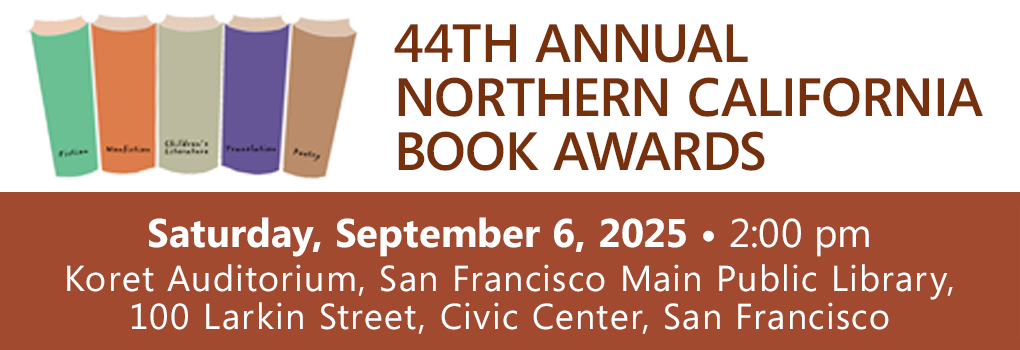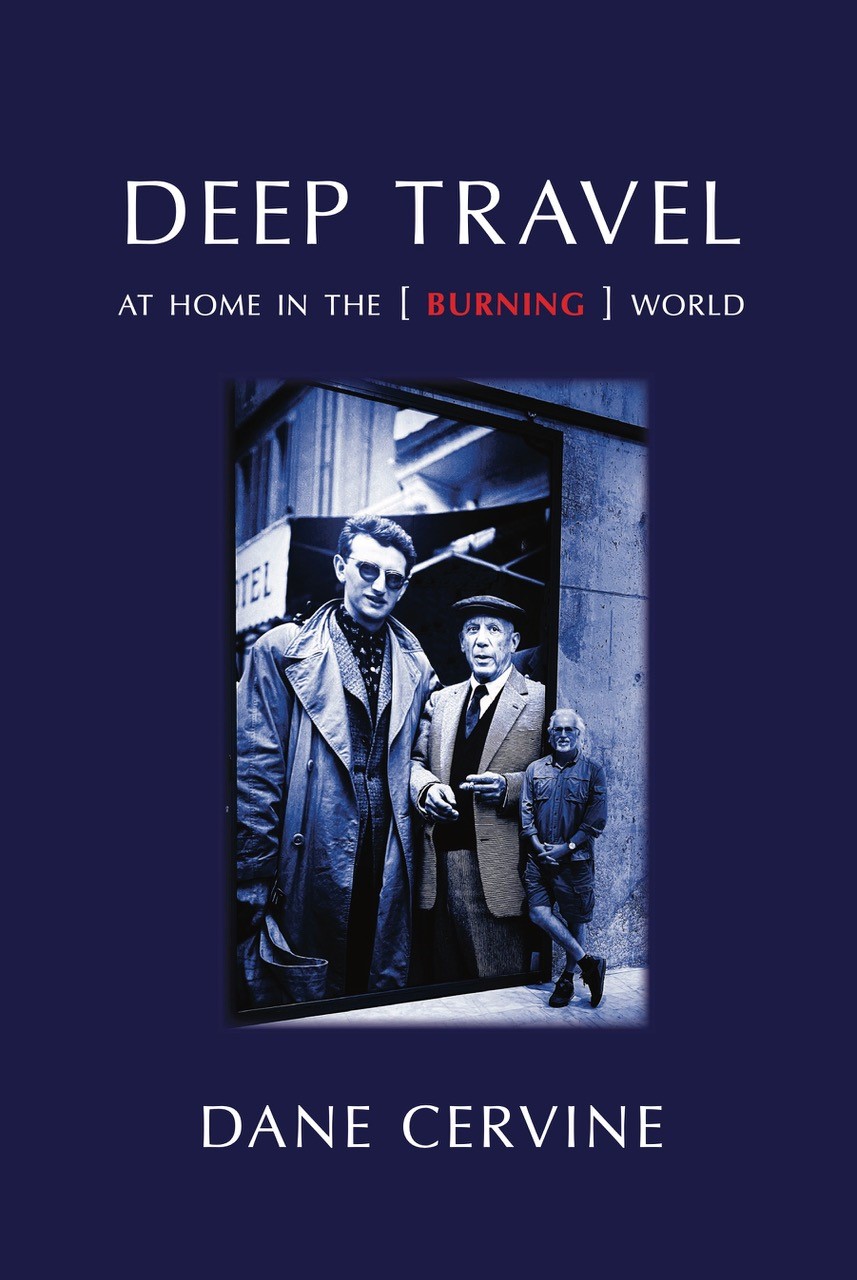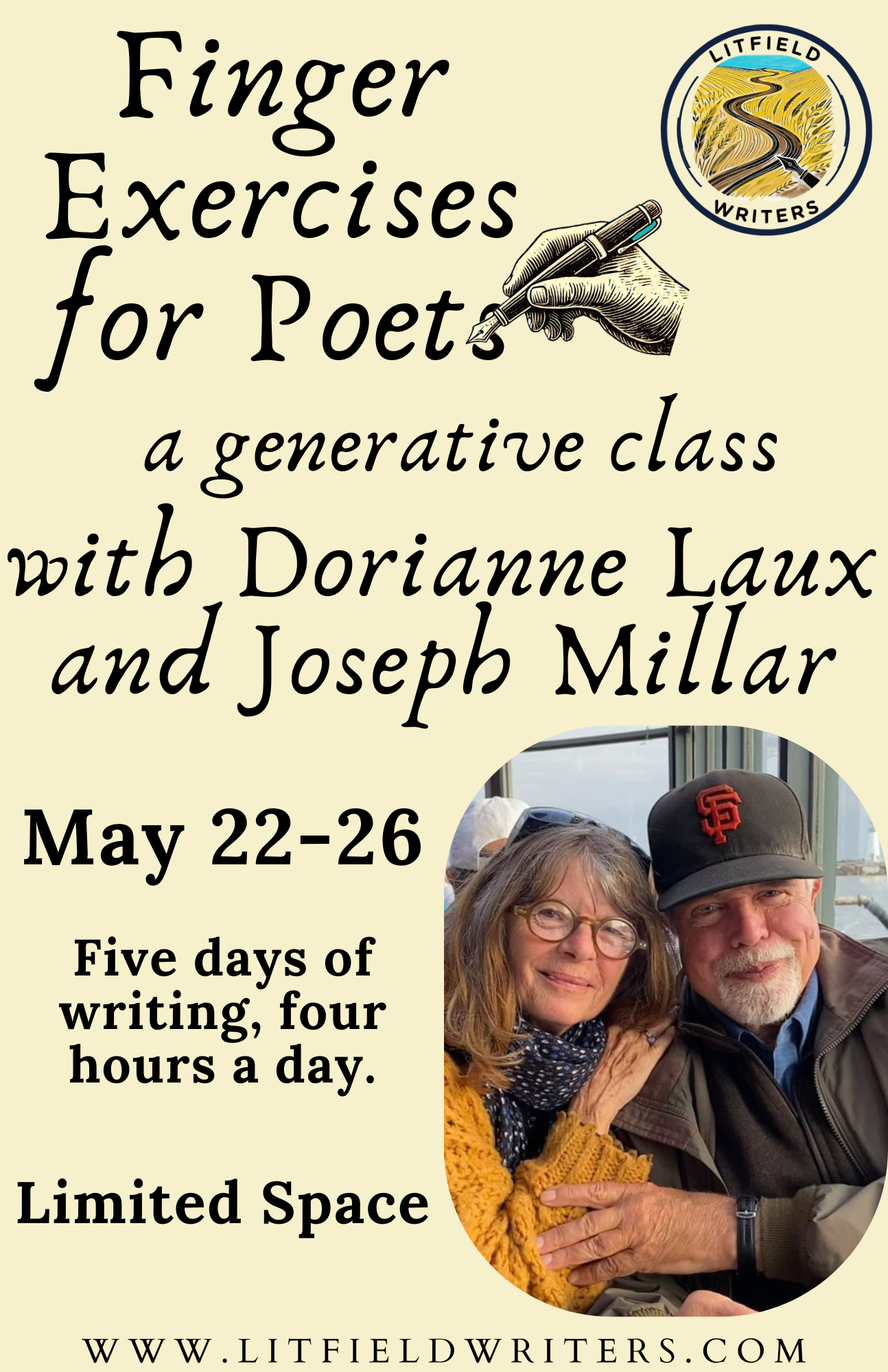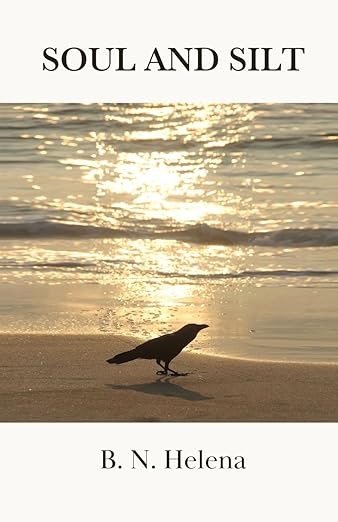

Michael McClure (1932-2020). Photo by Christopher Felver, circa 2000.
An Everything Man:
The Passing of Michael McClure
by Bruce Isaacson
THE WORLD SEEMS FILLED BY madness in the meanwhile, but the passing of Michael McClure at eighty-seven in May 2020 merits the consideration of poets. McClure was an everything-man, a star spanning the history of the era that made us—dramatist, novelist, songwriter, actor, theorist, performance artist, art critic, organizer, intellectual, and rock-and-roll performer. Few did as much to inaugurate and advance the alternative culture ethos of the 1950s and 1960s, as it became the broadly accepted—even dominant—popular culture. McClure was a trailblazer. His contributions include lyrics for a classic Janis Joplin song ("Mercedes Benz"), an Obie award-winning play (Josephine: the Mouse Singer), setting the stage for a sea-change in the theater (The Beard, which Sam Shepard acknowledged as an influence), a celebrated censorship case (The Beard, again), actor in a film directed by Norman Mailer, chronicler of the Hells' Angels, insider with The Doors, Dylan, and more. A handsome easy-going kid from Kansas, McClure became famous at the age of twenty-two and made himself an icon of Bay Area arts and culture.
Above the detritus that can dominate pop culture, above everything else, Michael McClure was an American poet. The insights that brought him to prominence in the post-war period came through poetry. McClure and an idiosyncratic group of writers and artists re-fashioned American culture. Starting in 1955, McClure read at the famed Six Gallery reading, with Gary Snyder, Phillip Whalen, and Phillip Lamantia, emceed by Kenneth Rexroth, where Allen Ginsberg debuted "Howl," with Jack Kerouac egging the readers on, and Lawrence Ferlinghetti in the audience looking for manuscripts. This reading is often celebrated as an inception of the San Francisco Poetry Renaissance. McClure's friendships and influence include championing key women Beat poets, including great writers such as Diane di Prima, Lenore Kandel, and Joanne Kyger. From a young age McClure had already read deeply and formed a worldview based in poetics including modernism (Lawrence, Pound, Yeats, Williams), Artaud, Charles Olson, and Bay Area writers who set the stage for the national explosion in poetry, such as Robert Duncan, Jack Spicer, and Kenneth Patchen. The focus on ecology and the natural world are among the cultural changes instigated at the Six Gallery reading. McClure's poems read there include "For the Death of 100 Whales," perhaps the first to lionize what became a key symbol of the next generation's appreciation of the natural world.
…Brains the size of a football
Mouths the size of a door.
The sleek wolves
Mowers and reapers of sea kine.
THE GIANT TADPOLES
(Meat their algae)
Lept
Like sheep or children…
Goya! Goya!
Oh Lawrence
No angels dance those bridges.
OH GUN! OH BOW!
There are no churches in the waves,
No holiness,
No passages or crossings
From the beasts' wet shore.
(from Of Indigo and Saffron, University of California Press, 2011, pages 31-32)
By starting with an excerpt of a brief Time magazine article about killer whales which zealously described the mass slaughter of a whale hunt by U.S. NATO troops, McClure reframed the identified 'killers' as the dominant, war-based elements of American society itself, creating its own Goya-esque nightmare. When he came to Las Vegas in 2016, McClure read the poem aloud for Nevada Public Radio, and chuckled (or scoffed, I'm not sure which) at the Las Vegas Strip signs advertising the local killer whale show. McClure came to Las Vegas to read, a generous gesture towards our desert city, only after a week in Death Valley taking in desert wildflowers. He was already eighty-four years old. In poems and life, McClure relished the natural world.
Michael McClure developed a personal poetic style that was at once readable, unique, and recognizable. The poems are dense, often centered on the page, with unconventional grammar, repetition, and capitalization. McClure's capitalizations were not 'shouting' as is sometimes intended in modern poetry. Instead, he wants to force us to look at words with fresh eyes. This extends to spelling words vertically down the page, as in the following thoughts which I found touching from his last book about a friend of many years:
…YOU
ARE
O
R
I
G
I
NATOR
of our understanding
as we stand hearing and seeing a landscape
before us in the Central Valley…
NOW YOU, LIKE ME
ARE EXTREMELY OLD
and you are alive in this
shape
as I am.
YOU WISH TO BE FULLY ALIVE
to feel the actual passing
when that passage happens
fully conscious
AND
YOU
ARE.
And you will be
more and more
(from "IVORY STATUETTE," Persian Pony, Ekstasis Editions, 2017, pages 33-34)
The effect is to disrupt our conventional prose methods of reading, so words, images, and meaning can be experienced freshly. However, McClure was not seeking effect in this or anywhere in his poetry. In the classic book, Scratching the Beat Surface, McClure states his intended relation between the reach of his poetry and its effect in the world:
I did not fear obscurity in my poetry because I had come to believe that the way to the universal was by means of the most intensely personal. I believed that what we truly share with others lies in the deepest, most personal, even physiological core—and not in the outer world of speech that is used for grooming and transactions. Further, as Clyfford Still, a contemporary of Jackson Pollock and a heroic Abstract Expressionist, said, "Demands for communication are presumptuous and irrelevant." Jazz and bop had convinced me that poets might also communicate by music, by sound, like Thelonious Monk, Charlie Parker, Miles Davis.
(from Scratching the Beat Surface, Penguin Books, 1982, page 26)
McClure insisted on the primacy of subjective experience throughout his work, demonstrating a private language of self-expression to make the personal-subjective universal. His reach for a common subjectivity is one of the things I love most in his poetry, and is frequently achieved with a telling detail, sound, (Grahhrr!!) or physical observation.
Yet it is perhaps as an agent—or dare I say, oracle—explaining the new consciousness of a younger generation in the 1960s and 1970s that the power of McClure's work comes into focus. The so-called 'new consciousness' did not have a better theorist or advocate than Michael McClure. His emphasis on Eastern spiritual traditions—Buddhism, Taoism, and others—helped create a grounded American spiritual counterpoint to the narrow cooptation of religion by the dominant post-war culture, forcing its demands of conformity. McClure blended a private weave of Eastern spiritual traditions as a core to his view of what American life could be. Among poets, McClure's spiritual approach most resembles Whitman's subtle smorgasbord of Eastern tradition synthesized and employed to shine light on a broad, new American path. McClure achieved this by referencing Eastern words and concepts in the poetry, which were the result of solid scholarship, deep reading, and a respect for personal experience. The work incorporates substantial wisdom as well about the big questions of life and death. Some of these poems are, I believe, true American classics, such as the following, whose value was pointed out to me by New York-Las Vegas poet Paul Michelson:
The Death of Kin Chuen Louie
NOW, ON THE DAY BEFORE MY DAUGHTER'S
TWENTY-FIRST BIRTHDAY,
ON THE AFTERNOON OF HER PARTY,
I REVISIT THE SCENE OF THE DEATH
of Kin Chuen Louie.
He too was between twenty and twenty-one.
The newspapers called him
a smalltime extortionist.
But what are we all but small
time extortionists in the
proportionless
universe?
(I am in awe of the thought
of the coolness and sureness
of his assassin.)
Twelve days ago, on the Festival
of the Lord Buddha, shortly
after two in the afternoon,
Kin Chuen Louie left his flat
on Kearney Street.
Louie's young, long-haired murderer,
in black jacket and army pants,
waited with a .380
Walther automatic pistol holding
fourteen bullets. Kin Chuen Louie,
spotting his assailant, leaped
into his bright red Plymouth Fury.
The murderer stepped
to the driver's side and fired a shot
into Louie. Louie started the ignition
and slammed into reverse.
His foot stuck on the accelerator.
The car, propelled backward with great
force, jammed between
a building and a white car
parked there—knocking loose shards
of red brick painted over with beige.
The murderer stepped quickly
to the passenger side of the trapped
and roaring car and fired seven bullets
through the windshield
into a tight pattern on the head and neck
of Louie. A ninth shot missed,
going finger-deep
into brick. The killer
fled a few yards, turned at the corner,
and disappeared down Sonoma Alley.
A moment later,
we arrived on the empty street
and looked through
shattered glass
at the young Chinese man—
blood pouring out of the holes
in his head—slumped over
on his side. It was like the close-up
in a Sam Peckinpah movie.
He was completely relaxed
—finally and almost pleasantly limp
and serene—wearing an army jacket
and grubby levis…a slender, handsome,
clean-cut face with short hair boyishly
hanging in his eyes above
the dime-size bullet holes.
The blood pouring onto the seat covers
was a thick, reddish vermillion.
There was a peaceful, robbe-grilletish,
dim light inside the car.
The shattered window was like
a frosted spider web.
Either death is beautiful to see
—or we learn the esthetic
of death from films. BUT I do know
that our physical, athletic body,
a thing of perfect loops, and secret
and manifest
dimensions and breathings of consciousness
and unconsciousness, emanates
rainbows and actions,
and black flowers
and
it is there
to bear us through this world
and to kiss us goodbye at the doorstep
of any other.
I praise Everything-That-Is
for that blessing.
I drink chrysanthemum
tea in his memory.
Candied ginger, scented with licorice
from Hong Kong
is on my breath.
I know each death
shall be as fine as his is.
(from Fragments of Perseus, New Directions, 1983, pages 19-21)
No poem could provide a more relevant, sensate tribute for McClure's passing, as he was a poet of profound love, trust in, and respect for the physical body. His attitude toward death contained all the strength and openness of a Romantic poet, such as his idol Percy Shelley. There is perhaps a parallel between the poets of the Romantic era and those of our own Beat era. The poets in both times initiated broad cultural change and filled a void in reaction to spiritual and political tumult. Yet the strength of these writers and their breadth of vision even today make simple categorization difficult. That is, they are larger than our existing categories and need to be defined as themselves.
As "The Death of Kin Chuen Louie" also illustrates, McClure's view of the mind and Intelligence is the Eastern view, not the Western. The Western view generally equates Intelligence with a proclivity to assemble and process information. In McClure's writings, Intelligence is the mind in a state laid open to the truth of the universe. As a thinker and teacher, he is closer to Krishnamurti, perhaps, than to the Western intellectual traditions that he also clearly prized. His writings favor discovery over direct simplicity, achievement in the arts over political means. For example, the following in response to a differentiation he made between 'revolution' and 'revolt':
I read the lines "capitalism will not help, socialism will not help, communism will not help." A week later, I was giving a reading with a fellow poet to raise money to give to the Salvadoran guerillas for medical supplies. So, I don't believe that because one takes a deeper approach to reality that one can avoid politics. I go on making political gestures that are necessary, that are important. I don't back away from them. I do not exist in an ivory tower because I believe that biology is the only meaningful area of change.…The problems are not the wars and the starvation and the chaos that's going on. The problems are what's causing the wars and the starvation and the chaos. Those are biological.…I really don't think that there are solutions in the sense that people speak of solutions. When I speak of a long-term solution I mean a new path.…You see the new poetry I'm speaking of is a poetry about experience, it's a poetry about consciousness, it's a poetry about the senses. Language is used in a way which is in revolt against a previous language, and it's a mutational divergence from the previous common use of language. It's in this change that we open the possibilities for a new ground upon which people may think and act. That's our duty as artists. We are not eco-politicians. We are not eco-philosophers. We are not eco-metaphysicians. We're artists.
(from Lighting the Corners, University of New Mexico Press, 1993, pages 5-8)
McClure saw himself as a poet first, though he was also a sharp cultural and artistic theorist in books of prose, such as the excellent Scratching the Beat Surface and the lesser-known but equally powerful Lighting the Corners. He was well known for supporting political causes, but did not expect political action could create the kind of fundamental, lasting change needed to improve the lot of people and society.
Again, McClure's theoretical grounding in poetry evidences his most basic strength. Even in his very last book, Persian Pony, McClure's preface insists on Projective Verse in American Poetry. Projective Verse—the breath-energized compositional form pioneered by Charles Olson while at Black Mountain was described in an essay that is a long classic of interest to every poet. When he came to Las Vegas, Michael was extremely proud of having been asked to deliver the Olson Lecture in Gloucester that year. McClure fought for energy and body-based unity in American verse throughout his career as a writer. Those who have not synthesized Projective Verse sometimes feel free verse techniques reflect an anything goes, no-rules version of modernity. However those, such as McClure, who have wrestled with the effort to encode the life-energy of modern breath in verse are sometimes able to provide a more profound and modern unity of form and content. McClure did this with strength, sophistication and Intelligence in some twenty-five books of poetry.
Another key achievement of McClure's writing is his multitude of connections to modern biological science. Through his correspondences with leading figures in biological sciences, such as the discoverer of DNA (and Nobel Laureate) Francis Crick, McClure brought key precepts of modern biological science into poetry and art, and was the first poet to explore the profundities of these connections. Many marvel at how close core conceptions of the physical sciences are to poetry. McClure brought that clarity into the modern, Post-Einstein era of science, particularly biology. Sometimes, the links are technical and complex, and sometimes they are simple but profound, such as his insistence that each biological entity (person, animal, plant) is designed to pursue its own meaningful purpose, which must be perceived and honored. Here, he links Eastern philosophies with modern biology and comes out with a new perspective on what it means to be human. Yet such perceptions for McClure were not just philosophical, but extended for example to his immediate honor and affection for my daughter's small Holstein-colored cat.
I know from watching that McClure cared profoundly about American poetry, and was proud of many directions it followed. Michael McClure helped navigate American poetry away from the easy surface floes that dominated other more financially reliant media of his era, such as film, toward a deeper and more profound idealism. Ironically, the idealism of this approach eventually provided the most powerful international appeal of American culture. The influence of McClure and other Beat poets around the world exceeds that of any American generation since the nation's founders.
McClure had come to Las Vegas previously to read in 2006. I vividly recall his explanation of the true power of poetry to an auditorium of community college students. "Poetry," I paraphrase, "is best recognized as the language of emotional desperation, of schism." I recall perhaps he was talking at the time about Antonin Artaud, another poet, dramatist, and artist whose work continues to exert considerable influence. Yet Michael's words stay with me, as many of his words do. They've helped me see and remember how deep advances in poetry are made mostly at great personal price.
There are particular poems I have loved and bonded to deeply, such as the cycles of poems in Rain Mirror, Mysteriosos, and Mephistos. These are each thirty-six poems that begin each poem identically and each end uniquely with new thinking and imagery. Both the commonality and alteration expand limited notions of what might be possible with the cycle(s) of poems. For example, the following three beginnings of each:
NOW I UNDERSTAND THE SEXUAL ADDITION
of my young manhood
was a CRUCIFIXCION—
glittering and lovely
AS
an ostrich boa and smashed mirrors
seen on acid.
Now
I see that perception is a shape
of the darkness
S
E
E
I
N
G
itself
Naked bodies in layers
on shelves in space,
and behind
stalactites
alight themselves seduce me
with fleshy softness
of their meat.
Calves.
Forearms.
And the perfumes!
THE PERFUMES ARE LOST
AS MOTHS
IN OUR HORMONAL STORMS
but they direct us.
—They guided me.
(from "Crisis Blossom," in Rain Mirror, New Directions, 1999, page 37)
•
NOW I UNDERSTAND, THE SEXUAL ADDICTION
of my young manhood
was a CRUCIFIXCION—
glittering and lovely
AS an ostrich boa and smashed mirrors
seen on acid. Now: I am an old man with a handsome face
and after the bloody movie full of guns and stabbings
and helicopters, I stop at a photo booth and in the mirror is a dog with jowls, a silver fox,
an eagle in the whirlpool…
(from "Dear Being," in Mysteriosos, New Directions, 2010, page 69)
•
NOW I UNDERSTAND THE SEXUAL ADDITION
of my young manhood
was a CRUCIFIXCION—
glittering and lovely
as the smile of Mephistos
through a realm of rosy smoke
rising from a bonfire of future loves.
Just that simple
—REAL FLESH
beginning to imagine
big crises where plain toes could step.
I love you,
YOU…
(from Mephistos, City Lights, 2016, page 19)
The continuity and progression of the cycle adds depth to the beauty and value of the work. What begins as recreation of the free love era, changes form (i.e. justification) to picture the poet grown old, and eventually becomes a poem of perspective on that journey, its lies, and of love for his wife.
He was long a friend to Poetry Flash, but I never knew Michael McClure well. It is sadly only after his passing that I recognize the depth of respect I developed for him and his work. As I turn tonight behind my typing desk to look at the McClure stack, I see books that stand over a foot high. These are books I have read, re-read, argued with in my mind, and often enough understood only years later. Michael became a pop-culture icon, but his essential approach is readily seen from discoveries found in his poetry. He believed poetry expressed something essential about the fabric of persons and people. This is a belief most poets share in a general way, and can readily learn from via Michael's expression. From a young age, McClure gave his life to the work of the arts. He managed to pursue the life of an artist and leaves a substantial audience and legacy of writings that will live on. The work will probably be studied and debated for generations. He not only affected his chosen art form greatly, but changed the world he encountered, sending it in a more human and humane direction. For a poet, I can't imagine anything better. ![]()
Bruce Isaacson's latest chapbook is Weep, Sing (2020), preceded by Crossing Over: Poems 2019. He is the publisher of Zeitgeist Press, with over one hundred books of poetry in its catalog. His full-length books include Bad Dog Blues (1988), Love Affairs with Barely Any People in Them (1990), Ghosts Among the Neon (2005), Dumbstruck at the Lights in the Sky (2008), and The Last Lie (2017). He lives in Las Vegas, where he was appointed the first Poet Laureate of Clark County Nevada in 2015.
— posted APRIL 2021
































































































